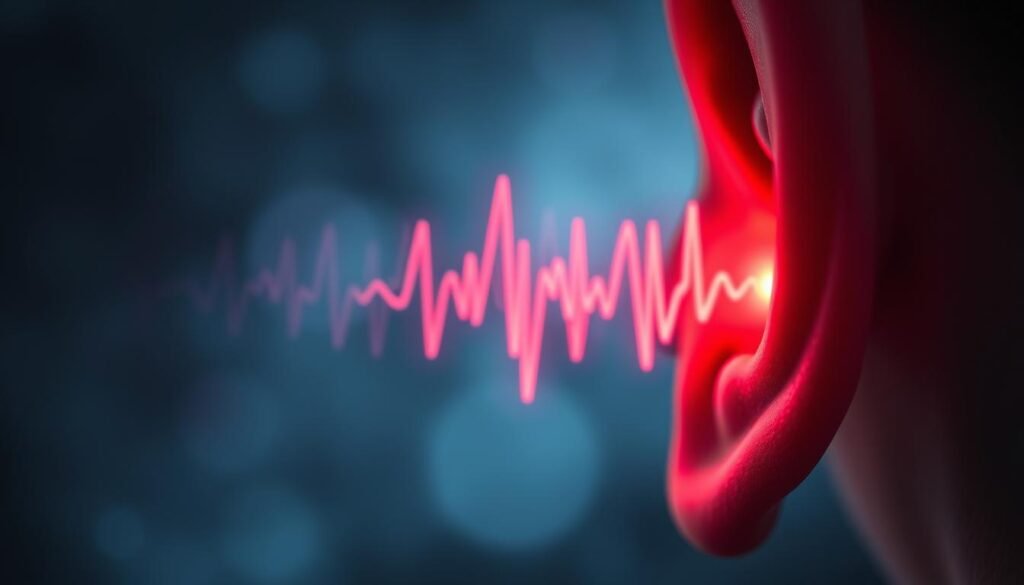Did you know about 15-20% of people feel tinnitus at times? Among these, pulsatile tinnitus is rare. It makes you hear rhythms matching your heartbeat. Hearing this thumping can be quite scary.
Finding out why it happens is key. Often, it’s due to issues like high blood pressure, not always serious health problems. Knowing this can lessen worries and guide towards proper treatment. If you’re dealing with these symptoms, understanding the triggers, like stress, can really help. It clears up health concerns. Learn more about the heartbeat sensation in your ear.
Key Takeaways
- Pulsatile tinnitus is a rare form of tinnitus, often more noticeable in quiet settings.
- The most common cause is venous sinus stenosis, especially prevalent in women.
- This condition may not indicate serious health issues but warrants medical evaluation.
- Healthy lifestyle choices can alleviate symptoms of pulsatile tinnitus anxiety.
- It’s essential to consult a doctor if symptoms persist or become more intense.
- Various imaging studies are used to diagnose the underlying causes of pulsatile tinnitus.
- Sound therapy and cognitive behavioral therapy can be effective coping strategies.
Understanding Pulsatile Tinnitus
Pulsatile tinnitus is a unique hearing issue. It’s marked by rhythmic sounds that match one’s heartbeat. People often hear whooshing, throbbing, or thumping in one or both ears. This condition differs from regular tinnitus, which has a steady sound. Pulsatile tinnitus is rarer and usually points to health problems.
Several things can cause pulsatile tinnitus, like high blood pressure, ear infections, and vascular issues. An overactive thyroid or head injuries might also cause it. Sometimes, it leads to ear pulsing anxiety, making the condition more stressful. This anxiety can make one more aware of their heartbeat in the ear, raising stress levels.
Symptoms include the sound itself, ear pressure, and sometimes trouble breathing. It’s crucial to see a doctor for a full check-up. They will look at your medical history, stress, and do tests to find any anxiety issues.
Treatment depends on what’s causing the tinnitus. Managing stress, lifestyle changes, and certain therapies can help. Cognitive-behavioral therapy (CBT) is often used, especially for heartbeat in ear anxiety. Getting professional help is key for those struggling with this hard condition.
Is It Normal to Hear Your Heartbeat in Your Ear?
Hearing your heartbeat in your ear can worry many people. Sometimes, it might be normal, but if it happens a lot, it could be a sign of health issues. In the U.S., around 50 million people have tinnitus. This includes pulsatile tinnitus, where you hear a rhythmic sound in sync with your heartbeat.
Some things can make this sound louder. Like when you lie down or change how your head is positioned. People often notice it more when it’s quiet. To answer if it’s normal to hear your heartbeat in your ear, we need to look into it more.
High blood pressure, certain medicines, and vascular issues can cause this. Other factors are ear blockages or damage and hearing loss from loud noises or aging. It’s common to feel anxious about ear pulsing. Almost 60% of those with pulsatile tinnitus feel depressed or anxious. It’s important to see a doctor if you keep hearing your heartbeat in your ear, especially with other worrying symptoms.
Looking into this early can help manage it. There are different treatments, depending on what you need. Knowing the link between hearing your heartbeat and health can help you take care of yourself better.

The Connection Between Heartbeat in Ear Anxiety and Mental Health
Hearing your heartbeat in your ear can cause a lot of anxiety and ear noises. It can mess with daily life by making it hard to focus and sleep. This sound can become a constant worry, increasing stress about health.
Studies show a strong link between heartbeat in ear anxiety and mental health. Anxiety can make your heart rate and blood pressure go up. This can make the heartbeat sound in your ear seem louder. Your body’s response to stress is controlled by the autonomic nervous system.
People with anxiety often pay more attention to their heartbeat. This can make the sound in their ear feel worse. They might hear a pulsing sound, feel off-balance, and feel uncomfortable. It’s important to understand this to manage it well.

To figure out heartbeat in ear anxiety, doctors will look at your health history and check things like blood pressure. Research shows a link between anxiety disorders and tinnitus. This points out the need for careful attention to these issues.
Reducing anxiety can help manage symptoms. Cognitive behavioral therapy, relaxing activities, and exercise are good ways to reduce anxiety. If you hear a pulsating sound a lot, you should see an ear, nose, and throat (ENT) doctor. They can help find the cause and how to treat it. Knowing how mental health and ear sounds are connected can help a lot.
To learn more about this, check out how anxiety and pulsatile tinnitus are.
What Causes the Thumping in Your Ear?
Hearing a thumping in your ear can be worrisome. It is caused by various conditions, some serious, some not. This sound often comes from changes in blood flow near the ear. High blood pressure can cause you to hear your own heartbeat. Meanwhile, blood vessel abnormalities might result in thumping sounds.
Being active can also make you hear these sounds. Sometimes, people feel more anxious because of these noises. This makes the sound seem louder. Narrowed arteries near the ears can also make this noise.
Certain health issues make people more likely to hear thumping sounds. For example, an overactive thyroid or severe anemia can cause it. Tumors pressing against blood vessels can make the sound more noticeable. Also, changes in brain fluid pressure can lead to these sounds.

To figure out the cause, doctors do a few tests. These include blood pressure checks and hearing exams. The treatment depends on what’s causing the sound. It might be lifestyle changes or even medical treatments.
It’s important to know why you’re hearing these sounds. If you’re feeling anxious because of the thumping, there’s help. For tips on dealing with anxiety, visit this site.
Common Conditions Related to Hearing Your Heartbeat
There are many health issues that might make you hear your heartbeat in your ear. Knowing about these can help find the cause and treat the symptoms.
Venous Sinus Stenosis
Venous sinus stenosis is when narrowed veins block blood flow. This can cause sounds in the ear like pulsatile tinnitus. Treatments include simple neck-compression techniques and venous sinus stenting. The latter is a more lasting solution.
Idiopathic Intracranial Hypertension
This disorder leads to high pressure inside the skull and mainly affects obese young women. It can cause headaches and vision problems. Treatment often involves losing weight, taking medication, and sometimes surgery.
High Blood Pressure and Its Impacts
High blood pressure is a big reason for hearing your heartbeat in your ear. This makes the blood flow forcefully, leading to the pulsations being heard. To manage this, eating healthy, exercising, and taking medication can help keep blood pressure in check.
| Condition | Symptoms | Treatment Options |
|---|---|---|
| Venous Sinus Stenosis | Pulsatile tinnitus, pressure in the head | Neck-compression techniques, venous stenting |
| Idiopathic Intracranial Hypertension | Headaches, vision disturbances | Weight management, medications, surgical intervention |
| High Blood Pressure | Pulsatile tinnitus, potential hearing loss | Lifestyle changes, medication |
Heartbeat in Ear Anxiety: When To See a Doctor
If you feel your heart beating in your ear, it’s important to know when to get help. Some people hear a pulsating sound in their ear, like a heartbeat. This might not worry you if it happens once in a while. But if it keeps happening, it could be a sign of health issues.
Feeling a pounding sound in your ear is a sign of pulsatile tinnitus anxiety. Anxiety can make this sensation stronger. Because of stress, the sound of your heartbeat in your ear can seem louder. This can make you feel dizzy or lightheaded.
If these symptoms often bother you, or mess with your daily life, see a doctor. Knowing when to see a doctor for your heartbeat in the ear can help you avoid bigger problems. Get checked especially if your mental health starts to suffer. This is key to finding and fixing any health problems.
Getting help early can make a big difference. You might learn how to relax or try cognitive behavioral therapy. You could also see a specialist. Taking action early helps make your life better.
Management and Treatment Options for Pulsatile Tinnitus
Pulsatile tinnitus can be tough to deal with. Treatment depends on what causes it, but a good plan can really help. Talking to doctors is key to find relief.
It’s important to get a thorough hearing test. This test helps figure out the root of tinnitus. It checks how you respond to sounds, which can point to different issues.
Here are common treatments for pulsatile tinnitus:
- Earwax removal to clear blockages
- Fixing vascular issues that might be causing symptoms
- Using hearing aids for hearing loss
- Devices that drown out the tinnitus sounds
- Behavioral therapies like Tinnitus Retraining Therapy (TRT) and Cognitive Behavioral Therapy (CBT) for better coping
Medicine can help manage the anxiety that comes with tinnitus. They treat related conditions or help reduce anxiety and sadness. Changing your lifestyle, like using ear protection and avoiding loud noises, helps too. White noise machines can make things more comfortable by masking tinnitus sounds.
Some people try acupuncture or herbs like Ginkgo biloba. The proof that these work isn’t strong, but they might help as part of overall wellness. Joining support groups and learning more about tinnitus can also make a big difference.
| Treatment Approach | Description |
|---|---|
| Audiologic Exam | Identifies specific sound responses linked to tinnitus causes. |
| Earwax Removal | Clears blockages that may exacerbate symptoms. |
| Noise Suppression Devices | Helps mask intrusive sounds related to tinnitus. |
| Medications | Addresses anxiety, depression, and other contributing factors. |
| Behavioral Therapy | Teaches coping strategies to handle tinnitus-related distress. |
Finding relief from pulsatile tinnitus often means trying different treatments. Keep talking to your doctors and try various methods. It can lead to a better life and less anxiety from tinnitus.
Research on the Relationship Between Anxiety and Ear Noises
Pulsatile tinnitus is often called heartbeat in ear anxiety. Many people find this condition quite distressing. It occurs due to abnormal blood flow near the ear or issues within the auditory system. There’s a lot of research on anxiety and tinnitus now. These studies show a strong link between anxiety and ear noises.
Anxiety changes how we feel internal sensations like our heartbeat. It affects our autonomic nervous system. High stress can disrupt this system, causing a pulsating sound in the ear. This can lead to a cycle where anxiety enhances symptoms of pulsatile tinnitus.
Heartbeat in ear anxiety symptoms may include pulsating sounds or irregular rhythms. People may feel uneasy, have a racing heart, or feel dizzy. About 45 percent of patients with long-term tinnitus also have anxiety symptoms. This shows the importance of addressing psychological factors in tinnitus patients.
To diagnose heartbeat in ear anxiety, doctors review medical history and examine the patient. They look for potential stress triggers. Research shows that stress is a big problem for chronic tinnitus patients. In cases of severe tinnitus, stress symptoms were reported in up to 100% of patients.
| Severity of Tinnitus | Stress Symptoms Prevalence |
|---|---|
| Slight Tinnitus | 44.4% |
| Mild Tinnitus | 55.5% |
| Moderate Tinnitus | 78.5% |
| Severe Tinnitus | 61.5% |
| Catastrophic Tinnitus | 100% |
It’s vital to understand how anxiety and ear noises are connected. This helps in treating pulsatile tinnitus anxiety effectively. Stress management and psychological support are key. They improve mental health and enhance the well-being of those affected.
Conclusion
Hearing a heartbeat in the ear can cause a lot of worry. This is often called pulsatile tinnitus anxiety. Knowing what causes it is important. It lets people seek the right medical help. Around 10% of adults in the U.S. experience tinnitus. Although it’s upsetting, there are many ways to deal with it effectively.
There are steps to manage pulsatile tinnitus anxiety. These include lifestyle changes and medical help. People can try relaxing activities and join support groups. It’s also good to stay away from loud noises. Talking openly with doctors is key. This ensures the right diagnosis and treatment. It helps improve health and lowers anxiety from hearing your heartbeat.
To sum up, dealing with pulsatile tinnitus can be tough. But, understanding and managing it can bring relief. With the right care and support, the effect on sleep, daily life, and mental health can be reduced. This leads to a healthier, more balanced life.